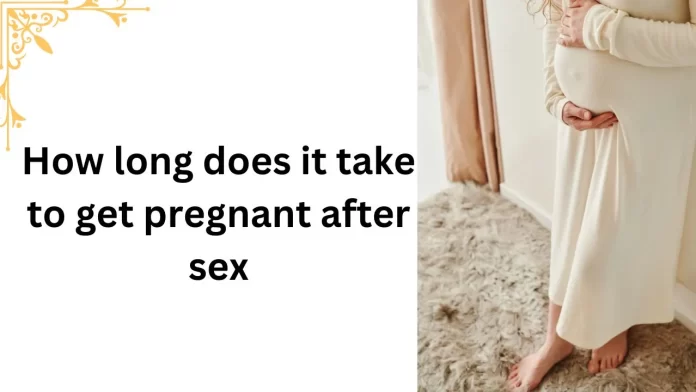Many couples dream of starting a family and getting pregnant is often the first step in achieving that goal. However, the time it takes to conceive can vary widely from person to person, and there are many factors that can affect the process. One of the most common questions couples have when trying to conceive is how long does it take to get pregnant after sex.
While the answer to this question is not straightforward and can depend on a range of variables, there are some general guidelines and information that can help couples better understand the process of conception and optimize their chances of getting pregnant. In this article, we will explore the factors that can influence the length of time it takes to get pregnant after sex and provide some insights into what couples can do to increase their chances of conceiving.
How Long Does it Take To Get Pregnant After Sex?
Many couples wonder how long it takes to get pregnant after having sex. While conception can happen immediately after intercourse, the process can take much longer for some couples. On average, it takes about 6 to 12 months to conceive, but this timeline can vary depending on a number of factors. Age, fertility, timing of ovulation, and overall health can all play a role in how long it takes to get pregnant.
Symptoms of Pregnancy After Sex?
Pregnancy after sex can be an exciting time for couples, but it can also be accompanied by a variety of symptoms. The earliest signs of pregnancy can appear as early as a few days after conception and can include:
Spotting and cramping:
Some women may experience light spotting and mild cramping in the first few weeks of pregnancy, which can be mistaken for a period.
Breast changes:
Hormonal changes during pregnancy can cause breast tenderness, swelling, and soreness.
Fatigue:
Many women feel exhausted during the first trimester due to hormonal changes and the increased demands on the body.
Nausea and vomiting:
Morning sickness, which can occur at any time of day, is a common symptom of pregnancy and can start as early as a few weeks after conception.
Food aversions and cravings:
Hormonal changes during pregnancy can cause changes in taste and smell, leading to food aversions or cravings.
Frequent urination:
The uterus expanding and hormonal changes can cause increased frequency of urination.
What to do after sex to conceive?
If you’re trying to conceive, there are several things you can do after sex to increase your chances of getting pregnant:
Stay lying down: Lying down for at least 10-15 minutes after sex can help the sperm travel further into the cervix and increase the chances of fertilization.
Elevate your hips: Elevating your hips with a pillow or other support can also help sperm travel closer to the cervix.
Don’t rush to the bathroom: Avoid going to the bathroom immediately after sex, as this can wash away sperm that are still trying to reach the cervix.
Time intercourse correctly: Try to have sex during the most fertile days of your menstrual cycle, which is usually around ovulation. Tracking your menstrual cycle and using ovulation predictor kits can help you determine when you’re most fertile.
Maintain a healthy lifestyle: Maintaining a healthy weight, eating a balanced diet, getting regular exercise, and avoiding smoking and excessive alcohol consumption can all improve your chances of getting pregnant.
Seek medical advice: If you’ve been trying to conceive for several months without success, it’s a good idea to speak with your healthcare provider. They may recommend fertility testing or other interventions to help you conceive.
Minimum how many days to get Pregnant?
There is no minimum number of days required to get pregnant. Conception can happen as soon as sperm meets an egg, which can occur during ovulation. Ovulation occurs when an egg is released from the ovaries and travels down the fallopian tube, where it can be fertilized by sperm.
For many women, ovulation occurs approximately 14 days before the start of their next menstrual period. However, this can vary depending on the length of the menstrual cycle and individual factors. It’s important to note that getting pregnant can take time, and it’s not uncommon for couples to try for several months before conceiving.
How long does it take to get pregnant when actively trying?
When actively trying to get pregnant, the amount of time it takes to conceive can vary from couple to couple. On average, it takes about 6 to 12 months for a healthy couple to conceive.
For couples in their 20s and early 30s who are actively trying to conceive and having regular, unprotected sex, the chance of getting pregnant each month is approximately 20-25%. As a result, it’s possible to conceive within the first month of trying, but it can take longer for others. Women in their late 30s and early 40s may experience a decline in fertility, which can make it more difficult to get pregnant.
How to avoid pregnancy after sex?
Several effective methods for avoiding pregnancy after sex, including:
Emergency contraception: Also known as the morning-after pill, emergency contraception is a type of birth control that can be taken after unprotected sex to prevent pregnancy. It is most effective when taken within 72 hours (3 days) of having sex, but can still be effective up to 120 hours (5 days) after sex.
Hormonal contraception: Hormonal methods of birth control, such as birth control pills, patches, and injections, can help prevent pregnancy if taken regularly as prescribed.
Barrier methods: Condoms, diaphragms, and cervical caps are examples of barrier methods of birth control that work by preventing sperm from reaching the egg.
Intrauterine devices (IUDs): IUDs are small, T-shaped devices that are inserted into the uterus by a healthcare provider. They can provide long-term protection against pregnancy, with some types lasting up to 10 years.
Natural family planning: This method involves tracking a woman’s menstrual cycle and avoiding sex during the time when she is most likely to become pregnant.
Frequently Asked Questions:
Q1: What are the early signs of pregnancy?
Ans: Early signs of pregnancy can include missed periods, nausea, fatigue, and breast tenderness.
Q2: How long should we try to conceive before seeking medical help?
Ans: It’s recommended to try for at least one year before seeking medical help for infertility.
Q3: Can I get pregnant if I have irregular periods?
Ans: Yes, it’s possible to get pregnant with irregular periods, but tracking ovulation can be more challenging.
Q4: Can using birth control for a long time affect my fertility?
Ans: Using birth control for a long time typically does not affect fertility, and most people are able to get pregnant after stopping use.
Q5: What are the most effective methods of birth control?
Ans: Some of the most effective methods of birth control include hormonal methods like the pill, IUDs, and sterilization.




